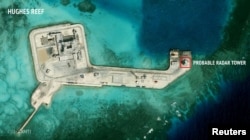An outraged China and jubilant Philippines are eyeing formal talks after a United Nations arbitration court on Tuesday rejected the legal basis for Beijing’s claim to the disputed South China Sea.
Beijing’s foreign minister Wang Yi scoffed at the Permanent Court of Arbitration’s ruling against the legal validity of the Chinese “nine-dash-line” claim to about 95 percent of the South China Sea, a 3.5 million-square-kilometer body of water that’s rich in fisheries, oil and natural gas, and is important for shipping lanes.
But he also hinted at wanting dialogue.
“Now, this farce is over, and it’s time to get back on the right track,” he said late Tuesday. “The Chinese side has noticed that the new government of the Philippines has recently made a series of statements including showing willingness to resume negotiation and dialogue with China over the South China Sea issue.”
U.S. officials are keen to encourage dialogue on the issue and are looking to a regional meeting of the Association of Southeast Asian Nations in July, where U.S. Secretary of State John Kerry may meet with Chinese Foreign Minister Wang Yi.
Deputy Assistant Secretary of State for Strategy and Multilateral Affairs Colin Willett told VOA on Wednesday that the coming ASEAN meeting provides an opportunity for countries to work on "a path forward."
Peace or conflict
A former U.S. commander told lawmakers Wednesday that the tribunal's ruling has provided a clear legal foundation for Washington to take a position on the dispute. Dennis Blair, a former commander of U.S. forces in the Pacific, said Washington should declare its willingness to use military force to oppose Chinese aggression at the disputed land features off the coast of the Philippines.
"Make it clear that the U.S. will support the Philippines to oppose the Chinese aggression there, and if necessary by military force," Blair told the Senate Foreign Relations Subcommittee on East Asia, the Pacific, and International Cybersecurity Policy.
At the White House on Wednesday, spokesman Josh Earnest emphasized that the U.S. embraces the peaceful resolution of the dispute through diplomacy. "We hope this is not an inflection point toward a deeper conflict," he said.
Multilateral vs bilateral talks
One longtime disagreement among countries in the region is how to engage in talks on the issue. Most countries, including the Philippines, have pushed for multilateral talks, through ASEAN or a similar body, to resolve all of the competing claims. Beijing has long said it prefers bilateral talks, one-on-one with each country.
Philippine President Rodrigo Duterte, who took office June 30, has said he is open to negotiating one-on-one with China, despite a tougher approach during an election campaign marked by profanity and promises.
Dialogue could head off any threats of war and make waters between the two countries safer for commercial use on both sides, particularly Philippine fishermen. It could also help China repair its image from Asia to the United States as a bully in the more than 40-year-old maritime dispute.
But there are worries that the ruling could plunge the region into more conflict. Some Filipinos expressed fear that China would defy the ruling and make things tougher for Philippine fishing boats in disputed waters. Those concerns increase the mandate to hold talks.
"It's very clear the Duterte government will try to negotiate with the Chinese to try to reach some kind of amicable settlement," said Jay Batongbacal, director of the Institute for Maritime Affairs and Law of the Sea at University of the Philippines.
"They have given an olive branch, shall we say, so they will probably reengage China in talks about the dispute," Batongbacal said. "The Philippine public clearly expects victory, for one, and they also expect the government to take a strong position vis-a-vis China on these territorial maritime issues."
Diplomatic balance
China is now caught between taking a hard line on safeguarding its territorial claims in the disputed South China Sea and finding a diplomatic way out of the international impasse, analysts say. Too hard of a line, such as the declaration of an air defense identification zone, will hurt China's already tarnished image around Asia, where it officially seeks to be a good neighbor.
"It is highly likely that China will undertake a show of military force to underline its sovereignty, but such measures will only aggravate China's battered image globally," Tang Siew Mun, a senior fellow at the regional strategic and political studies program under the ISEAS-Yusof Ishak Institute, wrote in an emailed reply to VOA.
At a press conference Wednesday in Beijing, Chinese vice minister for foreign affairs, Liu Zhenmin, said the tribunal report has not affected China-ASEAN cooperation but "only disturbed" it a little.
"We hope the South China Sea issue will not affect China-ASEAN cooperation," he said.
The vice minister emphasized that the Declaration on the Conduct of Parties in the South China Sea (DOC), which was signed by China and other claimants like Vietnam, Philippines, Indonesia, Malaysia and Brunei, would remain intact even after the report by the tribunal.
In a statement later Wednesday, Liu said China has the right to impose Air Defense Zone in the South China Sea area, and will do so if and when the security situation warrants.
He also said a major part of the world community is with China regarding the court ruling.
But China is unlikely to rally much support from other Asian countries in de-legitimizing the U.N. court, Tang said. He said an olive branch from Manila would offer a chance for China to salvage its pride and repair the damage already done.
Even if the Philippines and China reach a deal later, other maritime claimants and the United States will block China from shelving the verdict, which stripped China of its rights to 12 nautical mile territorial waters around most of the sea's islands and reefs.
"The U.S. government will give a lot of pressure for the Chinese government to implement the award. But China, its policy and position is very firm. It wouldn't change even a bit," Kong Lingjie, deputy dean of China Institute of Boundary and Ocean Studies at Wuhan University, told VOA.
Kong added that China will follow the example set by the U.S. in its rejection of an arbitration ruling, reached by the International Court of Justice in 1986 in favor of Nicaragua's complaints against the U.S. violation of its sovereignty. The Central American government withdrew its complaints in 1992 after the U.S. blocked enforcement of the judgement.
U.S. officials, though they do not claim the sea, expect China to follow laws if it wants to become a maritime power, retired U.S. admiral Michael McDevitt said.
"The danger to China's maritime power goal is nothing specific so much as it is more impressionistic, in that, China could easily be portrayed as a country that is not law-binding and therefore not a credible maritime power," said McDevitt, a senior fellow in strategic studies at the Washington-based Center for Naval Analyses.
State Department Correspondent Nike Ching and White House Correspondent Mary Alice Salinas also contributed to this report. Pros Laput contributed to this report from Manila and Saibal Dasgupta contributed from Beijing.








